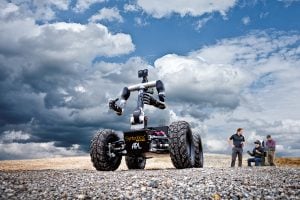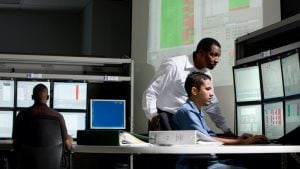
Robotics and Autonomous Systems Program Overview
Offered fully online, the master’s in Robotics and Autonomous Systems is a new Johns Hopkins Engineering for Professionals program created to strengthen the workforce in this critically important engineering discipline. A university and research powerhouse, we’re longtime pioneers in the robotic innovations used today in health care, defense, transportation, and more. Now we’re building on that experience and knowledge to offer working professionals a program that prepares them to create the future of safe and reliable human and robotic interaction.
As a student, you will be immersed in a curriculum focused on developing your skills for analyzing, designing, building, programming, deploying, and evaluating robots and autonomous systems. Artificial and machine learning concepts are integrated into the program, ensuring that you will emerge with the ability to develop robotics and autonomous systems that:
- Safely interact with humans and other robots
- Perceive and understand their environment, plan to achieve goals, and execute multi-step tasks
- Employ multi-modal sensors to navigate and control their trajectories in diverse environments
- Collaborate with humans and other robots to accomplish goals
- Operate over a continuum ranging from human remote control to full autonomy
Master’s Degree Focus Areas
A focus area must be selected. While required to narrow your study, your focus area will not appear on your degree.
- Dynamics, Navigation, Decision, and Control: A program of study that focuses on robotics and autonomous systems’ physical embodiment that enables them to move through their environment to perform tasks.
- Perception and Cognitive Systems: Designing advanced perception, reasoning systems, and cognitive systems to interpret the raw data of the sensory systems that generate immense quantities of images, video, depth-maps, optical flow, movements, etc.
- Autonomous Systems: Designing autonomous systems, kinetic and non-kinetic robotic systems, that can perceive themselves and their surroundings, interpret their perceptions, develop courses of action to accomplish goals, execute the goal, and check to determine if anything has changed.
- Human-robot and Robot-Robot Teaming: A focus on designing autonomous systems that find solutions to challenges such as acting in fair, ethical, and socially acceptable ways as they team with humans. Furthermore, creating systems that can meet the challenges that arise from complex ecosystems of intelligent systems—such as autonomous vehicles, smart cities, etc.—whose behaviors are emergent and unpredictable.
- General Robotics: Focuses on a broad range of knowledge in robotics and autonomous systems and the opportunity to design studies based on personal interests.
focus area requirements
Programs
We offer one program option for Robotics and Autonomous Systems, which you can complete fully online.
Robotics and Autonomous Systems Courses
See course requirements, prerequisites, focus areas, and electives offered within the program. For exact dates, times, locations, fees, and instructors, please refer to the course schedule published each term.
Robotics and Autonomous Systems Seminars at Johns Hopkins University
Students interested in the Masters in Robotics and Autonomous Systems and the Master of Science in Engineering in Robotics are encouraged to take advantage the University’s world leadership in research and development in robotics and autonomous systems.
Program Contacts
-
Email:dsilber1@jh.edu

-
 Email:llw@jhu.edu
Email:llw@jhu.edu
-
Tony Johnson
Program Manager Artificial Intelligence, Program Manager Computer Science, Program Manager Cybersecurity, Program Manager Data Science, Program Manager Information Systems Engineering Email:ajohn260@jhu.edu
Email:ajohn260@jhu.edu
-
Erhan Guven
Assistant Program Manager Artificial Intelligence, Assistant Program Manager Computer Science, Assistant Program Manager Cybersecurity, Assistant Program Manager Data Science, Assistant Program Manager Information Systems Engineering, Assistant Program Manager Robotics and Autonomous Systems Email:eguven2@jhu.edu
Email:eguven2@jhu.edu
-
Ian McCulloh
Assistant Program Manager Artificial Intelligence, Assistant Program Manager Computer Science, Assistant Program Manager Cybersecurity, Assistant Program Manager Data Science, Assistant Program Manager Information Systems Engineering, Assistant Program Manager Robotics and Autonomous Systems Email:imccull4@jhu.edu
Email:imccull4@jhu.edu
-
Email:inolan1@jhu.edu
-
Email:Valeria.Alfaro@jhuapl.edu
Tuition and Fees
Did you know that 78 percent of our enrolled students’ tuition is covered by employer contribution programs? Find out more about the cost of tuition for prerequisite and program courses and the Dean’s Fellowship.
Why Hopkins?
Build on your robotics and autonomous systems degree by engaging with all the rest Johns Hopkins has to offer.

Expert Faculty - Study with faculty who are practicing scientists and notable professionals with corporations and government entities, including the Johns Hopkins Applied Physics Lab, NASA, Raytheon, and the U.S. Department of Defense. Exceptional one-on-one mentoring sets you on a course to be a confident, knowledgeable leader. Learn More

Beyond Rankings: We Help You Fulfill Your Vision - We are proud to be ranked among the top online graduate engineering schools by U.S. News & World Report. But we’re about more than just numbers and rankings—we’re focused on making sure you flourish as a learner and engineer. Learn More

Network and Connect - Your knowledge is stronger with a network. In the applied and computational mathematics program, you will make career-advancing connections with accomplished scientists and engineers who represent a variety of disciplines across many industries. Learn More



